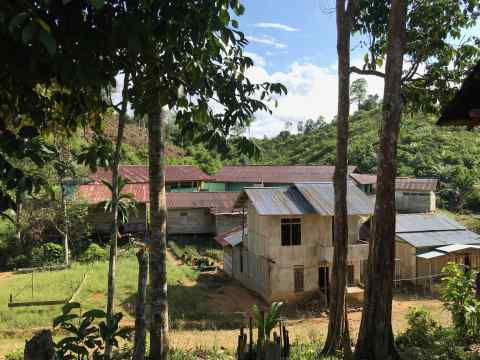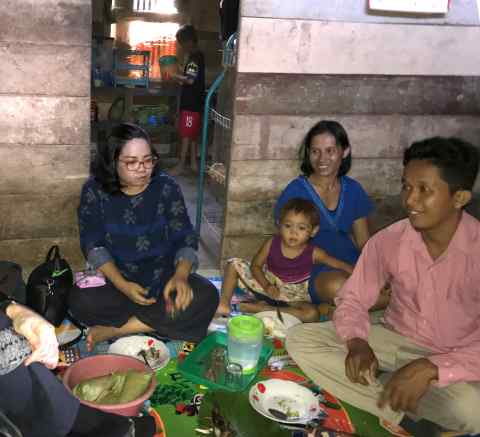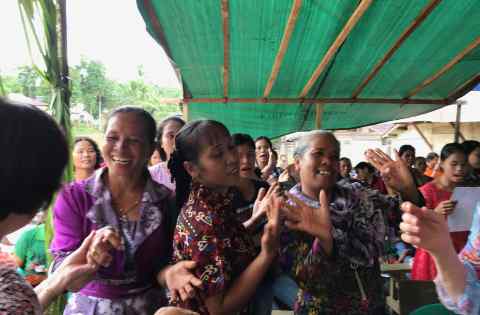Robeno* Bible Festival
- sharontan5
- Jul 11, 2018
- 4 min read

The Singapore group
In May 2018, I accompanied a group of five people from Orchard Road Presbyterian Church to visit the Robeno translation project in a neighbouring country and attend a Bible Festival for one of the languages. For those five days, we left our comfort zone in Singapore to experience basic amenities in a village – and share in the joy of the villagers as they celebrated the arrival of Scriptures in their language.
We first visited a translation workshop in the district capital during their third and final week. Translators from six different languages were there, along with their facilitators and translation consultants. They had finished checking Luke 8–10 and were busy producing booklets from those chapters as well as other portions that had been translated previously. Although one of the language groups lived in the capital, the others lived further away. One group needed two days to travel back to their home!
During closing ceremony of the workshop, the group from Singapore sang a worship song in one of the languages (we had practised beforehand!). It was much appreciated by everyone.
We and some of the workshop facilitators then accompanied this group back to their home region for a Bible Festival. Because of the pouring rain, what was usually a five-hour journey turned into an eight-hour journey, much of it on rough roads. It was already 9 pm when we finally arrived in the village.
We, with other guests, stayed in the best accommodation in the village – the pastor’s house. Some unforgettable experiences for us city folks from Singapore – sleeping closely packed together on thin mattresses on the floor; sharing the single bathroom in the house; flushing the squat toilet with a dipperful of water from the ‘tangki’ or water tank next to it; and bathing with water dipped from the same tank. When the water ran low, the pastor turned on a generator for electricity to refill it from another, larger tank. This village had no piped water, but caught and collected rainwater from the roofs.
The hospitality we experienced was wonderful. The pastor and his family not only gave up their bedrooms for us, but they also fed us and all the other visitors – about 25 of us. Through the two days we stayed there, there were a few women busy in the small kitchen all day, turning out rice, vegetables and meat dishes for every meal.
After breakfast the next day, the men in the group were invited to bless the rice harvest at a villager’s house. Imagine their surprise when they entered his rice barn and were confronted by a cooked whole chicken beside a bowlful of rice sitting atop the sacks of rice – the traditional offering to the spirits. Even though this village was Christian, many people still trusted in the old rituals for their security. Later that morning, one of the visiting pastors preached about it. He said that, when he was a child, he trusted in the sacrifice of chickens, but now he put his trust only in the blood of Jesus. The following day, there were more requests for all of us to pray for blessing on the rice harvest. This time, there were no chicken offerings. However, at one home we enjoyed a delicious traditional meal of roasted chicken and rice wrapped in leaves.
Traditional chicken offering; Bible festival
The day was entirely occupied with the Bible Festival. It took place at the village church which was packed with visitors from 11 other villages. There was much singing and many speeches. This was followed by competitions for Bible reading, Bible memorisation, and singing of Christian songs. There were also games for children, and a photobooth that immediately printed out pictures of villagers with a Bible verse in their language printed on them.
The singing contest generated the most interest. All ages competed – from a group of older ladies who also danced in their traditional style, to a group of children who had walked two hours from another village to take part. The children didn’t win a prize, but still they were happy as they prepared to walk two hours back to their home.
The following day was a Sunday, so we were back at the church for the morning service. Once again, the congregation and many performing groups sang songs in their language. Our group from Singapore also sang our song again! Then, the elder leading our group preached a sermon in English with interpretation.
The journey back to the district capital took only five hours. We brought back memories of the hospitality of the villagers, and the joy and cheerfulness of the children, even though they didn’t have much. This trip showed us that there is a big world beyond the rich and comfortable shores of Singapore. We saw that people can be happy with very few material possessions – but also that having only a little of the Word of God in the national language isn’t enough for them to have a good footing in the gospel. The Gospel of Luke is reaching them as it gets translated bit by bit. But there is so much more than they need to know and understand. We pray that in time they will understand in full, and that their joy will be complete.

Felicia* has been a member of Wycliffe Singapore since 1996. She worked for two years in the Philippines as an Academic Publications Manager, then moved to a nearby country to work in a language project. In 2011 she returned to Singapore for family reasons. In 2016, she began working in the Wycliffe Singapore office. At this time, she is looking to get involved in field work once more.
* Not the real name










Commenti